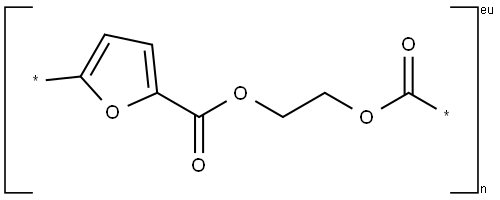Product Description:
Polyethylene 2,5-furandicarboxylate (PEF) is an emerging bio-based polyester that is positioned as a sustainable alternative to conventional petroleum-derived polymers like polyethylene terephthalate (PET). It is synthesized from 2,5-furandicarboxylic acid (FDCA), which can be derived from renewable resources such as plant sugars. PEF exhibits superior barrier properties against gases like oxygen, carbon dioxide, and water vapor compared to PET, making it highly attractive for packaging applications. Additionally, it possesses enhanced mechanical strength, thermal stability, and is recyclable, contributing to its potential in creating more sustainable and higher-performing products.
Product Properties:
Property Value Chemical Name
Polyethylene 2,5-furandicarboxylate
Common Abbreviation
PEF
CAS Number
28728-19-0
Monomers
Ethylene glycol and 2,5-Furandicarboxylic acid (FDCA)
Polymer Type
Bio-based polyester
Appearance
Typically a clear, amorphous or semi-crystalline thermoplastic
Density
Approx. 1.4 – 1.5 g/cm³
Glass Transition Temp.
Approx. 75-85 °C (higher than PET)
Melting Point
Approx. 210-235 °C (can vary with crystallinity)
Key Advantages
Excellent barrier properties (O2, CO2, H2O), higher tensile strength than PET, bio-based, recyclable
Primary Use
Sustainable packaging, films, fibers
Note: Exact values can vary depending on the specific grade, molecular weight, and processing conditions.
Product Usage:
Packaging Solutions:
Beverage Bottles: Used for carbonated soft drinks, water, beer, and juices due to its superior gas barrier properties, extending shelf life. For example, 100% bio-based PEF bottles for soft drinks.
Food Containers: Ideal for packaging oxygen-sensitive foods, reducing spoilage and maintaining freshness. For instance, trays and containers for fresh produce or dairy.
Flexible Films: Employed in multilayer packaging films for items like snacks, coffee, and medical products where barrier performance is crucial.
Fibers and Textiles:
Apparel and Industrial Yarns: Can be processed into fibers for clothing, carpets, and technical textiles, offering good mechanical properties and a sustainable profile. For example, bio-based sports apparel.
Specialty Applications:
Automotive Components: Potential use in interior and under-the-hood parts due to its thermal and mechanical properties.
Biomedical Devices: Being explored for applications due to its biocompatibility and barrier characteristics.
Electronic Casings: Offers a sustainable alternative for casings of electronic devices.
Contact Us Now!
If you need MSDS,TDS or sample testing, please email us at pharm@sinocurechem.com or use the website live chat to get prompt reply.
- +86 13345119692
- +86 15550440621
- pharm@sinocurechem.com

